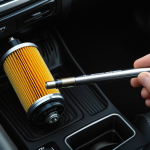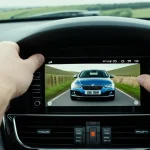Immediate Actions to Maximise Brake Longevity
Maintaining sports car brake health starts with daily and weekly inspections, especially important for high-performance vehicles navigating the variable UK climate. Regularly check brake pads for uneven wear or thinning to spot early signs of brake wear. These signs include unusual noises, longer stopping distances, or vibration during braking—all critical indicators that immediate brake care is required.
Adapt brake maintenance tips to UK-specific conditions, such as frequent exposure to road salt in winter and stop-and-go traffic in urban areas. Road salt accelerates corrosion on discs and calipers, demanding thorough cleaning and drying after each drive. Consistent inspection counters the damaging effects of wet weather and grime.
Additional reading : Ultimate DIY Handbook: Your Complete Guide to Installing and Personalizing Aftermarket Car Security Systems in the UK
Keeping your brake system dry and free from dirt preserves brake efficiency. Also, monitor the brake fluid level and quality, since moisture ingress lowers braking performance. Immediate brake care includes flushing and replacing fluid promptly if contamination is detected. Prioritising these daily and weekly actions ensures your sports car’s brakes remain responsive, safe, and reliable on UK roads.
Immediate Actions to Maximise Brake Longevity
Taking prompt immediate brake care steps is crucial, especially for owners of high-performance and sports cars. Regular brake maintenance tips start with daily visual inspections. Check for uneven wear on pads or rotors, which could indicate alignment issues or caliper problems. Weekly checks should include ensuring brake fluid levels are adequate and free of contamination, as degraded fluid can harm brake system response.
This might interest you : Ultimate DIY Manual: How to Effortlessly Install an Aftermarket Sunroof in Your UK Vehicle
Recognising early signs of brake wear is essential. Listen for squealing or grinding noises, feel for vibrations through the brake pedal, and watch for longer stopping distances. These symptoms suggest worn pads or warped discs, requiring immediate attention to avoid costly damage.
Adapting maintenance routines to UK driving conditions further protects brake health. The frequent use of road salt during winter can accelerate corrosion, so cleaning brakes and undercarriage regularly is important. Stop-and-go traffic, common in UK urban areas, places additional strain on brakes, making routine inspections even more vital.
By combining vigilant immediate brake care, taking account of UK-specific challenges, and following simple yet effective brake maintenance tips, sports car owners can significantly extend their brakes’ lifespan and performance.
Proven Maintenance Strategies for Sports Car Brakes
Effective sports car brake maintenance involves routine servicing that prioritises both safety and performance longevity. Experts recommend scheduling routine brake servicing at regular intervals aligned with manufacturer guidelines, typically every 10,000 to 15,000 miles, but more frequent checks may be necessary under intensive UK driving conditions. These sessions should include comprehensive inspections of pads, discs, calipers, and brake lines to identify wear or damage early.
Cleaning is a foundational part of extending brake life, particularly in the UK’s damp, salt-affected climates. Frequent washing removes corrosive road salt and grime that accelerate component degradation. Use brake-specific cleaning products to avoid damaging sensitive parts while ensuring debris and brake dust do not build up and reduce efficiency.
Choosing the correct brake fluid is crucial in UK weather, where moisture can compromise braking power. High-quality, moisture-resistant fluids with correct DOT ratings keep the system responsive and prevent hydraulic failures. Lubricants applied to caliper pins and contact points during servicing prevent sticking and uneven pad wear.
Following these brake maintenance tips firmly establishes a preventative approach that enhances safety and ensures your sports car’s braking system functions optimally, even in challenging UK road conditions.
Immediate Actions to Maximise Brake Longevity
For optimal sports car brake health, consistent application of brake maintenance tips through daily and weekly inspections is vital. Daily checks should focus on detecting wear irregularities in brake pads and discs, as uneven wear often signals underlying mechanical issues. Weekly inspections must include verifying brake fluid quality and level, because contaminated fluid reduces braking effectiveness and can accelerate system wear.
Recognising early signs of brake wear—such as squealing noises, vibrations, or increased stopping distances—alerts drivers to the need for immediate brake care before damage worsens. These symptoms often point to degraded pads or warped rotors, which compromise safety and performance if left unaddressed.
Adapting maintenance to UK driving conditions is essential. The frequent application of road salt in winter accelerates corrosion and demands thorough cleaning to protect metal brake components from damage. Additionally, urban stop-and-go traffic increases brake system strain, emphasizing the need for more frequent inspections and fluid replacements.
Adopting these targeted brake maintenance tips and swift intervention strategies ensures sports car brakes remain responsive, durable, and safe under varied UK driving demands.
Immediate Actions to Maximise Brake Longevity
Daily and weekly checks are essential for sports car brake health, especially under demanding UK conditions. First, visually inspect brake pads for thinning or uneven wear, which signals the need for immediate brake care. Early detection prevents costly damage and ensures continued performance. Brake pads that have worn beyond safe limits significantly reduce stopping power and can damage rotors if ignored.
Listening for unusual noises like squealing or grinding helps identify worn pads or contaminated surfaces. Vibrations felt through the pedal or steering wheel also indicate potential brake wear or rotor issues. Monitoring braking distance is crucial—if stopping distance increases, immediate brake care is necessary to maintain safety.
UK-specific factors profoundly influence brake longevity. Frequent exposure to road salt aggressively accelerates corrosion on rotors and calipers, which can cause premature part failure. After winter drives, thorough cleaning and drying of brake components help mitigate salt damage. Additionally, stop-and-go traffic common in UK towns demands more frequent brake use, increasing wear. Adapting brake maintenance tips by increasing inspection frequency during these conditions enhances sports car brake health and extends service life.
Immediate Actions to Maximise Brake Longevity
Consistent daily and weekly checks form the backbone of effective immediate brake care for sports car owners. These inspections focus on spotting irregular wear on brake pads and discs early—particularly vital for high-performance vehicles facing the UK’s challenging road conditions. Checking brake fluid levels and condition weekly is essential, as moisture contamination significantly decreases braking responsiveness.
Recognising early signs of brake wear can prevent costly repairs and maintain sports car brake health. If you hear squealing or grinding noises, feel vibration through the brake pedal, or notice increased stopping distances, these symptoms typically indicate worn pads or warped rotors. Immediate attention to these signs is necessary to avoid further damage and ensure safety.
UK-specific factors demand tailored maintenance routines. During winter, frequent exposure to corrosive road salt accelerates rust on discs and calipers, so thorough cleaning after drives is mandatory. Similarly, urban stop-and-go traffic increases brake system stress, requiring more frequent inspections and fluid changes to uphold brake performance.
By integrating vigilant brake maintenance tips with awareness of UK driving conditions, sports car drivers can extend brake longevity and maintain reliable stopping power in all environments.
Immediate Actions to Maximise Brake Longevity
Daily and weekly brake checks remain fundamental to sports car brake health, particularly for high-performance models driven in the UK. Daily inspections must include looking for brake pad wear irregularities and measuring pad thickness to ensure they have not thinned past safe limits. Weekly checks should extend to confirming brake fluid condition and level, since old or contaminated fluid hampers braking efficiency and accelerates system deterioration.
Recognising early signs of brake wear can prevent expensive repairs. For example, squealing or grinding noises typically indicate worn pads or uneven rotor surfaces. Vibrations in the brake pedal or steering wheel suggest potential rotor warping or caliper issues. An increase in stopping distance is a critical warning that requires immediate brake care to maintain safety.
Adaptation to UK-specific driving challenges is essential. Road salt used in winter accelerates corrosion on rotors and calipers, so frequent cleaning and drying after exposure are necessary maintenance steps. The stop-and-go traffic often encountered in UK cities places extra strain on brakes, necessitating more frequent inspections and fluid replacements for optimal sports car brake health.
Immediate Actions to Maximise Brake Longevity
Performing consistent daily and weekly checks is essential for maintaining sports car brake health, especially in the UK’s demanding environments. Focus on visually inspecting brake pads for thinning or uneven wear, which signals the need for immediate brake care. Pay attention to brake discs for surface cracks or grooves, as these can affect braking efficiency. Monitoring the brake fluid level and quality weekly is critical; moisture contamination in fluid reduces hydraulic responsiveness and accelerates wear.
Recognising early signs of brake wear includes listening for squealing or grinding noises and feeling pedal vibrations. Increased stopping distances also indicate potential brake system issues requiring urgent attention.
Adapting brake maintenance routines to UK conditions is vital. Frequent exposure to road salt in winter promotes corrosion on discs and calipers. Thus, thoroughly cleaning brakes after rides prevents rust. Urban stop-and-go traffic further increases brake stress, so inspections and fluid replacements should be more frequent in these scenarios.
By integrating vigilant brake maintenance tips with tailored UK-specific care, owners can proactively address brake wear. This approach helps maximise component lifespan and ensures reliable, safe braking under varied driving demands.
Immediate Actions to Maximise Brake Longevity
Performing daily and weekly brake maintenance checks is essential for sustaining sports car brake health. Focus first on inspecting brake pads for wear patterns and thickness; pads thinning below the manufacturer’s minimum compromise safety and performance. Equally important is monitoring the brake discs for scoring or heat damage during your weekly routine. Checking brake fluid levels and clarity prevents moisture contamination, a common concern in the UK that diminishes braking responsiveness and promotes corrosion.
How do you recognise early signs of brake wear? Listen for persistent squealing or grinding, which point to worn pads. Feeling vibration in the brake pedal or steering wheel often signals rotor warping or uneven pad contact. An increase in stopping distances is a critical warning; immediate brake care is mandatory to restore safety.
Adapting to UK driving conditions is pivotal. The frequent use of road salt in winter accelerates corrosion on rotors and calipers, making thorough cleaning after each drive indispensable. Urban, stop-and-go traffic increases brake usage and heat buildup, accelerating wear rates. Adjusting inspection frequency and maintenance routines to these factors ensures your brakes remain reliable, responsive, and durable in all UK environments.
Immediate Actions to Maximise Brake Longevity
Daily and weekly checks are crucial for maintaining sports car brake health, especially in the UK’s varied conditions. Begin by inspecting brake pads for uneven wear and thickness to identify issues early. Pay attention to brake discs, checking for surface cracks or grooves. Monitoring brake fluid weekly is essential, as contamination reduces hydraulic efficiency and accelerates brake wear.
Recognising early signs of brake wear is key to effective immediate brake care. Squealing or grinding noises typically indicate worn pads, while pedal vibrations often signal warped rotors or caliper malfunctions. An unexpected increase in stopping distance always requires prompt action to prevent safety compromises.
Adapt these checks to UK driving challenges. Frequent exposure to road salt in winter causes corrosion that rapidly degrades brake components, so cleaning and drying brakes after exposure is vital. Urban stop-and-go traffic further stresses brakes, necessitating more frequent inspections and fluid changes. Implementing targeted brake maintenance tips based on these factors ensures optimum sports car brake health, prolonging brake life and sustaining reliable performance under demanding UK road conditions.
Immediate Actions to Maximise Brake Longevity
For sustained sports car brake health, daily and weekly checks are crucial. Daily inspections should focus on pad thickness and wear patterns since uneven or thin pads lead to reduced braking efficiency and potential rotor damage. Weekly checks must include monitoring brake fluid for clarity and level, as contaminated fluid impairs hydraulic pressure and accelerates component wear.
Recognising early signs of brake wear is key to timely intervention. Persistent squealing noises often indicate worn pads requiring immediate brake care. Grinding sounds suggest severe pad degradation or rotor contact, demanding urgent service. Vibrations through the brake pedal or steering wheel typically result from warped rotors, while increased stopping distances signal overall brake system decline.
Adaptation to UK-specific challenges is essential. Frequent exposure to road salt during winter causes corrosion on discs and calipers, necessitating thorough cleaning after every drive to prevent premature failure. Additionally, stop-and-go urban traffic in the UK imposes extra demands, making frequent inspections and fluid replacements vital to maintain brake responsiveness and longevity.
Incorporating these brake maintenance tips ensures your high-performance sports car braking system operates reliably and safely under all UK driving conditions.









